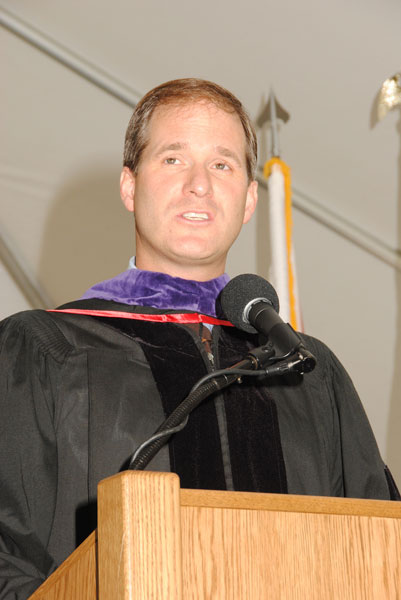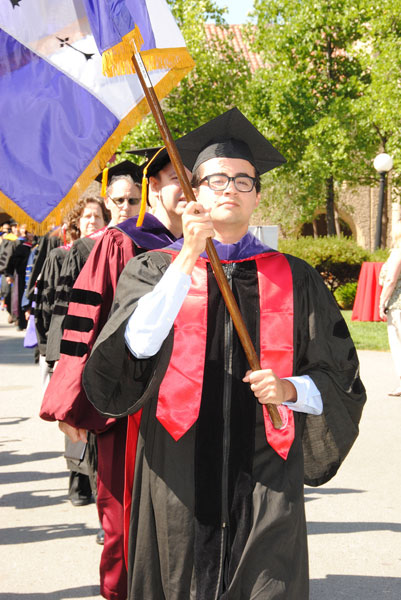Law School graduating class urged to strike a balance with career and personal life – and to make a difference in the world
This news story was originally published in Stanford Report.
“I leave it to you to decide whether someone can be truly happy if they reform prisons and right a string of wrong precedent, but make a mess of their relationships with friends and family; if they argue brilliantly and frequently in court, but too often with their loved ones; if politicians and reporters return their calls, but their children won’t talk to them,” Robert Daines, the Pritzker Professor of Law and Business, told graduates at the Law School’s graduation on Saturday, June 16.

The sun shone brightly on this year’s Stanford Law School graduation, with temperatures in the 90s not enough to dampen the enthusiasm of the newest crop of JDs.
Larry Kramer, the Richard E. Lang Professor of Law and Dean, welcomed the 1,500 or so parents, grandparents, husbands, wives, children and friends of the Class of 2012 to the ceremony in Canfield Courtyard on June 16 and introduced Maggie Ellen Filler, who had been chosen by her classmates to deliver the student remarks.
“Like doctors, we too hold the keys to a mysterious kingdom. Ours is a kingdom of ancient Latin terminology, of writs, ceremony and tailored suits. I know of no kingdom more forbidding nor more powerful. Our job is to act as bridges and to communicate across fortified walls. To do this, we need to understand the languages both of power and of the disempowered,” Filler said as she recounted her experience losing her first case, one taken with enthusiasm as a lawyer in training in the clinical program.
“When I found out we lost our case, I had to rethink everything I thought I knew about my worth as a lawyer,” Filler said. She described several days of mourning over the loss – and the turnaround.
“By the fourth day I was working on my appeal. I felt a renewed sense of purpose, and a healthy indignation at the court,” she said. “And I began to realize that I needed another measure of professional success, one that doesn’t depend on winning and losing. … Even when we lose, we can appeal. We can make it known that we don’t agree with the result. We can assure our clients that we still believe in them and that we’re willing to fight for them – even when the legal victory eludes us.”
Christy Ann Ferioli, Katherine Cain Hudson and Meryn Christine Novinger Grant, co-presidents of the graduating class, presented the awards for 2012. Ferioli presented the Dean’s Award for Excellence in Service to classmate Elizabeth Anne Kolbe. Hudson presented the Staff Appreciation Award to Faye Deal, associate dean for admissions and financial aid. And Grant presented the John Bingham Hurlbut Award for Excellence in Teaching to Robert Daines, the Pritzker Professor of Law and Business, saying that it was no surprise that the students had chosen him for the honor.
“He had become completely invested in teaching corporate law to his 70 students, making the study of a supposedly dry subject enjoyable,” Grant said. “In one memorable class he stood on a desk and shouted out an opinion for emphasis. His passion for teaching and dedication to his students made his class a memorable experience.”

Daines addressed the crowd, which included 182 candidates for the Doctor of Jurisprudence degree, 11 for the degree of Master of the Science of the Law, 3 for the degree of Doctor of the Science of the Law and 47 for the Master of Laws degree in the areas of corporate governance and practice, and law, science and technology. He recalled their admissions essays from three years earlier, and one in particular in which a student admitted to “that big fear: the fear of being inconsequential.” Daines spoke to that fear, one he thought all success-driven people likely shared. He also warned of risks inherent in that drive, particularly at the cost of personal relationships and aspirations.
“Obviously this desire to matter and make a difference is laudable and noble,” he said. “But … you may find along the way that your desire to contribute and be consequential can lead you to neglect valuable, though less immediately urgent, goals – relationships, partners, family and friends – and this will leave you and your loved ones unhappy in the long run.”
Daines recalled the time just after he began teaching when he was focused on securing tenure and working very hard. His wife, frustrated because he was constantly working or thinking about work, locked him in his office “so he could really focus.” He got the message.
“You will have a lot of interesting opportunities in life. Though you may harbor private doubts about it, in time you will be offered exciting clerkships, professorships, partnerships, judgeships – all manner of ships will be yours. The allure of these opportunities will make it more difficult to spend time with friends and family.” Acknowledging that this group of graduates represented the best of America, Daines cautioned them to find balance.
“Being true to the relationships and people in your life will not be easy, in part because you are all so driven to succeed, to do something important and to avoid seeming, if only to yourself, inconsequential,” Daines said. He urged the new lawyers to find the time and energy for what matters to them – without neglecting the people in their lives. “I leave it to you to decide whether someone can be truly happy if they reform prisons and right a string of wrong precedent, but make a mess of their relationships with friends and family; if they argue brilliantly and frequently in court, but too often with their loved ones; if politicians and reporters return their calls, but their children won’t talk to them.”
In the closing address to the class, Kramer noted the “deeply troubled” state of the world and the inability of governments to find solutions. “Whatever side of the political divide you’re on, challenges like energy, health care, the national debt, joblessness, international peace and stability and more are huge – and they require a seriousness of purpose and a willingness to take action that the world’s current feckless leadership is apparently unable to muster,” he said.
Kramer lamented today’s state of political partisanship, not simply because of the government paralysis it has produced but also because it threatens democracy. “These developments matter because they undercut a – no, the – fundamental precondition for democratic government in any complex society: that it be a community of individuals who, because they inevitably will disagree on important matters, are willing to reconsider their stances and to compromise based on respectful discussion with people who believe differently.”
Kramer praised a key value that he thought all lawyers should embrace. “Compromise is not at odds with values in a democratic society. On the contrary, it is one of such a society’s paramount values,” he said.
Kramer charged the Class of 2012 to do better: “Fortunately, if history teaches us anything, it’s that great challenges bring great opportunities. Which means you leave here with opportunities to make a difference that are rare. So we say to you, rise to the challenge. Be ambitious, take chances, do something that makes the world a better, safer place.”
Sharon Driscoll is the editor of Stanford Lawyer magazine and associate director of communications at Stanford Law School.
Additional resources:
- The Stanford Law School Class of 2012 Graduation Archive
- Speech by Dean Larry Kramer
- Speech by Rob Daines, Pritzker Professor of Law and Business, recipient of the John Bingham Hurlbut Award for Excellence in Teaching
- Speech by Maggie Filler, Class Speaker
- Photos on Flickr
